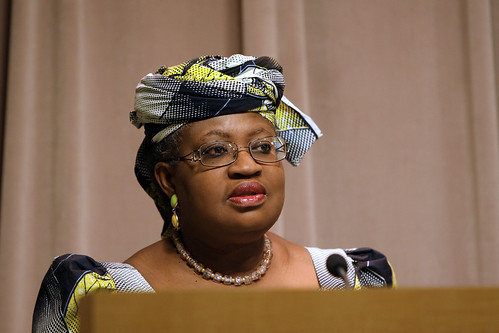Not even the eruption of Iceland’s Eyjafjallajokull could keep the Netherlands’ Prince of Orange, the chair of the UN Secretary General’s Advisory Board on Water and Sanitation, and the World Bank’s Ngozi Okonjo-Iweala from participating in a Davos-style panel discussion of solutions for the 2.6 billion people who still lack access to sanitation.
The BBC’s Katty Kay moderated today’s official Spring Meetings event, which also included South Africa’s Minister of Water and Environmental Affairs Buyelwa Patience Sonjica; Senior Deputy Assistant Administrator at USAID’s Bureau for Global Health Gloria Steele; Ek Sonn Chan from Cambodia’s General Director of the Phnom Penh Water Supply Authority; and IFC’s Executive VP Lars Thunell.
I haven’t seen the Bank’s J building mini-amphitheater filled with that much energy since, well, ever. The standing room-only event started with a delighted Ngozi acknowledging the crowd for bringing the issue of water and sanitation to such a high level on the occasion of the Spring Meetings.
She cited a couple of examples that until recent days had been tucked away in her memory for some time.
“As a child, I remember walking five miles with laundry, washing it, filling up a tub of water, and carrying it back for another five miles,” she recalled. “The next day we had to do it all over again. It was one of the most difficult things.”
She cited another personal experience related to sanitation from four years later. “I remember growing tired after walking up a flight of stairs, which used to be simple. One day my husband found me on the floor at the top of the stairs. The baby was crying. I had fainted. At the hospital they found I had masses of hookworms from the village where I had lived. These stories are meant to show you that this event today is not just an academic exercise, but a real issue.”
With roughly 4000 children dying preventable deaths each day because of improper water and sanitation, the panelists used today’s session as a platform to discuss the issue before an audience of finance ministers and news media.
The World Bank Group is a key partner in the water and sanitation sector. The Bank is the largest single source of funding for water and sanitation, with $4.3 billion in lending devoted to this area in 2009. In addition, the World Bank-administered Water and Sanitation Program provided $30 million in free technical assistance to 25 countries to scale up successful sanitation and water projects.
There are few development challenges that are so cheaply remedied, yet it is still a sector that is only now moving up on the development agendas of many countries.
USAID’s Gloria Steele said, if we want long-term solutions, we have to look at the private sector, pointing out that non-bilateral aid has now surpassed bilateral aid. Lars Thunell cited an output-based aid approach in which donors pay for meters and initial connections, and then consumers are able to pay greatly reduced prices.
Minister Sonjica and Ek Sonn Chan also gave first-hand accounts from South Africa and Cambodia. “This isn’t about numbers, it’s about people,” said Minister Sonjica. “Access to safe water and sanitation is a right, even for the poor who can’t afford it.”
Ek Sonn Chan was able to increase the percentage of people with access to safe water in the capital, Phnom Penh, from 20 percent to 90 percent. He said that donors and others outside a country must complement, rather than substitute, homegrown solutions. His Excellency also talked about how even many officials in Cambodia would not pay their water bills. So in some cases, such as for one general, they finally decided to cut services altogether. The general paid three months later and is now current.
When asked what the media should do to bring more attention to water and sanitation, the BBC’s Kay said that journalists like to tell a good story: “They just need the story to tell, and it always helps to frame it in another cross-cutting issue like climate change.”
Personally, I’m hoping discussions at the Spring Meetings, following on the unprecedented collaboration across the sector for World Water Day, bring sanitation and water to the top of finance ministers’ agendas so that these preventable deaths quickly become a thing of the past.
More information:
- Text of Ngozi Okonjo-Iweala's remarks
- Water and Sanitation Program
- World Bank Water Sector
- Photos from Water and Sanitation event





Join the Conversation